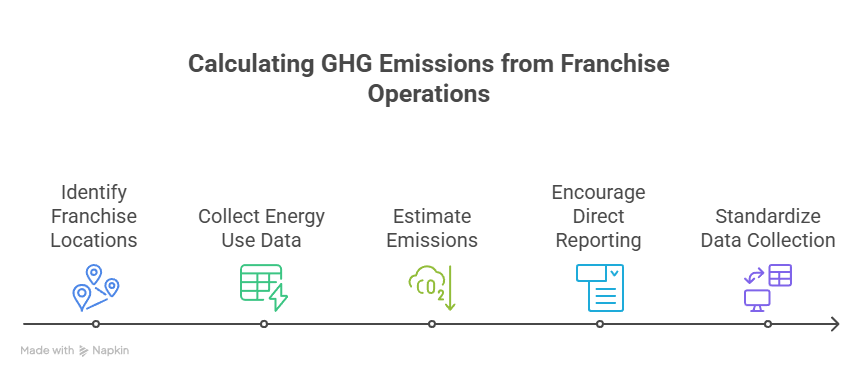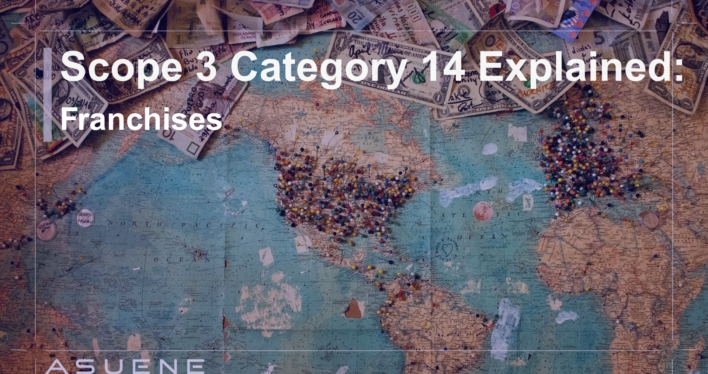- Article Summary
-
What Is Category 14?
Scope 3 Category 14 covers greenhouse gas (GHG) emissions from the operation of franchises not included in Scope 1 or 2. This applies to franchisors who do not own or operate the franchise locations directly but retain brand ownership. The emissions stem from the energy and resource consumption of franchisees that use the company’s name, systems, and products.
This category is relevant in sectors such as fast food, hospitality, retail, and personal services, where franchises are a dominant business model.
Why Category 14 Matters
Franchise-related emissions can be a significant portion of a brand’s value chain, particularly when franchisees operate thousands of locations globally. Addressing Category 14 helps franchisors to:
- Understand the full climate impact of their business model
- Support franchisees in improving environmental performance
- Align with science-based targets and stakeholder expectations
- Maintain consistent brand sustainability across operations
Franchise networks can amplify or undermine corporate ESG initiatives depending on the level of environmental governance and support provided by the franchisor.

How to Calculate Category 14 Emissions

GHG emissions from franchise operations are typically calculated using the formula:
Emissions = Σ (Franchise energy use × Emission factor)
Steps include:
- Identifying the number and types of franchise locations
- Collecting data on energy use and business activities
- Estimating emissions using utility bills, benchmarks, or regional averages
- Encouraging direct data reporting by franchisees when feasible
Many companies use software tools and digital platforms to standardize data collection across franchised units.
Regulatory Landscape (as of 2025)
While there is no direct mandate for Category 14 emissions yet, disclosure expectations are tightening:
- EU Corporate Sustainability Reporting Directive (CSRD) encourages full Scope 3 transparency, which may include franchised operations
- SBTi FLAG Guidance promotes full value chain accountability in agriculture and food sectors
- Investors and ESG rating agencies increasingly ask for data on emissions from brand-aligned operations like franchises
Companies with large franchising networks face growing reputational and regulatory pressures to address these emissions.

Case Studies: Real-World Examples
McDonald’s: Targeting Franchisee Emissions with Science-Based Goals
McDonald’s includes franchisee energy use in its Scope 3 reporting and works with franchisees to implement efficiency measures and renewable energy projects. The company has set science-based targets that account for emissions from its franchise network.
Marriott International: Carbon Tracking in Hospitality Franchises
Marriott tracks energy and emissions data from franchised hotels through its environmental management platform. This data supports its global decarbonization strategy and reporting to CDP and other frameworks.
The Body Shop: Supporting Franchise Sustainability Initiatives
The Body Shop collaborates with franchisees to align local store operations with corporate sustainability standards. Initiatives include energy efficiency upgrades and sustainability training programs.
Conclusion
Scope 3 Category 14 emphasizes the shared responsibility between franchisors and franchisees in addressing climate impacts. Although franchises operate independently, their emissions are tied to the brand and its public ESG commitments.
Franchisors that engage franchisees in climate strategies and provide tools for emissions reductions can build a more resilient, sustainable brand network while driving long-term value creation.
Why Work with ASUENE Inc.?
Asuene is a key player in carbon accounting, offering a comprehensive platform that measures, reduces, and reports emissions, including Scope 1-3, with expertise in decarbonization. Asuene serves over 10,000 clients worldwide, providing an all-in-one solution that integrates GHG accounting, ESG supply chain management, a Carbon Credit exchange platform, and third-party verification.
ASUENE supports companies in achieving net-zero goals through advanced technology, consulting services, and an extensive network.


